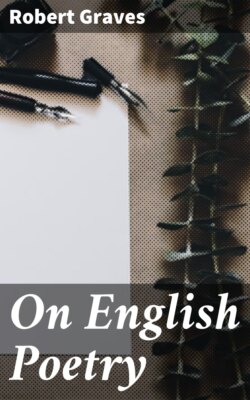Читать книгу On English Poetry - Robert Graves - Страница 5
На сайте Литреса книга снята с продажи.
III
POETRY AND PRIMITIVE MAGIC
ОглавлениеTable of Contents
ONE may think of Poetry as being like Religion, a modified descendant of primitive Magic; it keeps the family characteristic of stirring wonder by creating from unpromising lifeless materials an illusion of unexpected passionate life. The poet, a highly developed witch doctor, does not specialize in calling up at set times some one particular minor divinity, that of Fear or Lust, of War or Family Affection; he plays on all the emotions and serves as comprehensive and universal a God as he can conceive. There is evidence for explaining the origin of poetry as I have defined it, thus:—Primitive man was much troubled by the phenomenon of dreams, and early discovered what scientists are only just beginning to acknowledge, that the recollection of dreams is of great use in solving problems of uncertainty; there is always a secondary meaning behind our most fantastic nightmares. Members of a primitive society would solemnly recount their dreams to the wise ones of the clan and ask them to draw an inference. Soon it happened that, in cases of doubt, where the dream was forgotten and could not be recalled, or where it was felt that a dream was needed to confirm or reverse a decision, the peculiarly gifted witch doctor or priestess would induce a sort of self-hypnotism, and in the light of the dream so dreamed, utter an oracle which contained an answer to the problem proposed. The compelling use of rhythm to hold people’s attention and to make them beat their feet in time, was known, and the witch doctor seems to have combined the rhythmic beat of a drum or gong with the recital of his dream. In these rhythmic dream utterances, intoxicating a primitive community to sympathetic emotional action for a particular purpose of which I will treat later, Poetry, in my opinion, originated, and the dream symbolism of Poetry was further encouraged by the restrictions of the taboo, which made definite reference to certain people, gods and objects, unlucky.
This is not to say that verse-recital of laws or adventures or history did not possibly come before oracular poetry, and whoever it was who found it convenient that his word stresses should correspond with beat of drum or stamp of feet, thereby originated the rhythm that is common both to verse and to poetry. Verse is not necessarily degenerate poetry; rhymed advertisement and the memoria technica have kept up the honest tradition of many centuries; witty verse with no poetical pretensions justifies its existence a hundred times over; even the Limerick can become delightful in naughty hands; but where poetry differs from other verse is by being essentially a solution to some pressing emotional problem and has always the oracular note.
Between verse, bad poetry and fake poetry, there is a great distinction. Bad poetry is simply the work of a man who solves his emotional problems to his own satisfaction but not to anybody else’s. Fake poetry, the decay of poetry, corresponds exactly with fake magic, the decay of true magic. It happens that some member of the priestly caste, finding it impossible to go into a trance when required, even with the aid of intoxicants, has to resort to subterfuge. He imitates a state of trance, recalls some one else’s dream which he alters slightly, and wraps his oracular answer in words recollected from the lips of genuine witch doctors. He takes care to put his implied meaning well to the fore and the applicants give him payment and go away as well pleased with their money’s worth as the readers of Tupper, Montgomery and Wilcox with the comfortable verses supplied them under the trade name of “Poetry.”
Acrostics and other verses of wit have, I believe, much the same ancestry in the ingenious double entendres with which the harassed priestesses of Delphi insured against a wrong guess.
